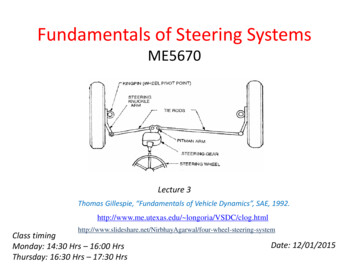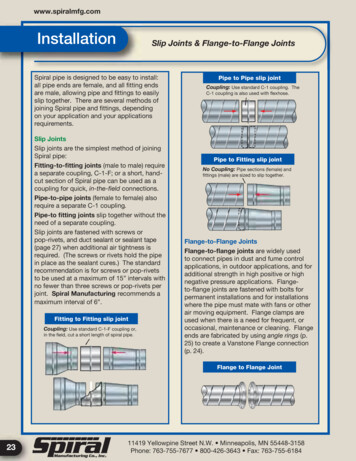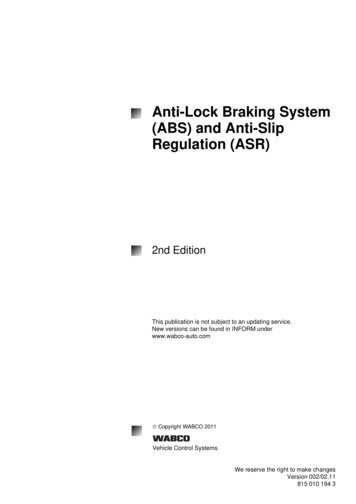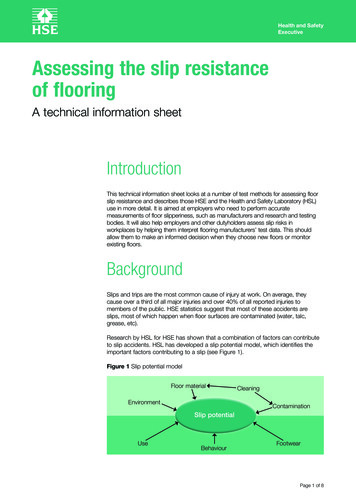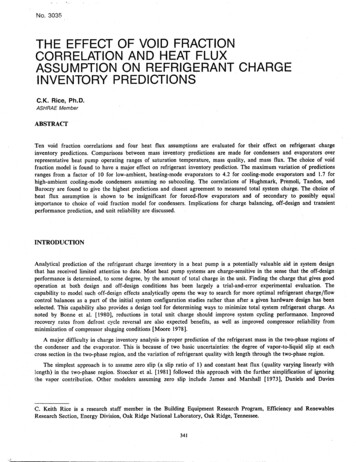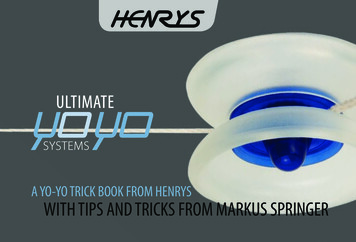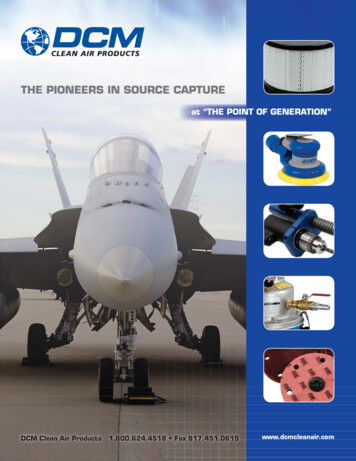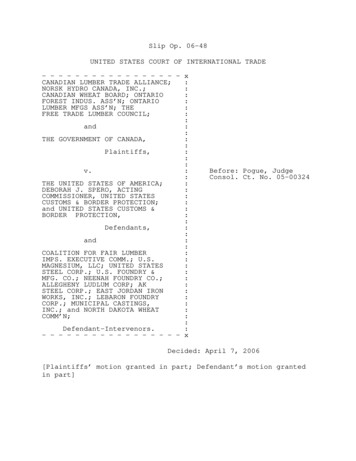
Transcription
Slip Op. 06-48UNITED STATES COURT OF INTERNATIONAL TRADE- - - - - - - - - - - - - - - - - xCANADIAN LUMBER TRADE ALLIANCE;:NORSK HYDRO CANADA, INC.;:CANADIAN WHEAT BOARD; ONTARIO:FOREST INDUS. ASS’N; ONTARIO:LUMBER MFGS ASS’N; THE:FREE TRADE LUMBER COUNCIL;::and::THE GOVERNMENT OF CANADA,::Plaintiffs,:::v.::THE UNITED STATES OF AMERICA;:DEBORAH J. SPERO, ACTING:COMMISSIONER, UNITED STATES:CUSTOMS & BORDER PROTECTION;:and UNITED STATES CUSTOMS &:BORDER PROTECTION,::Defendants,::and::COALITION FOR FAIR LUMBER:IMPS. EXECUTIVE COMM.; U.S.:MAGNESIUM, LLC; UNITED STATES:STEEL CORP.; U.S. FOUNDRY &:MFG. CO.; NEENAH FOUNDRY CO.;:ALLEGHENY LUDLUM CORP; AK:STEEL CORP.; EAST JORDAN IRON:WORKS, INC.; LEBARON FOUNDRY:CORP.; MUNICIPAL CASTINGS,:INC.; and NORTH DAKOTA WHEAT:COMM’N;::Defendant-Intervenors.:- - - - - - - - - - - - - - - - - xBefore: Pogue, JudgeConsol. Ct. No. 05-00324Decided: April 7, 2006[Plaintiffs’ motion granted in part; Defendant’s motion grantedin part]
Steptoe & Johnson, LLP (Mark A. Moran, Kaija Wadsworth, MatthewS. Yeo, and Michael T. Gershberg) for Plaintiff Canadian Lumber TradeAlliance;Steptoe & Johnson, LLP (Gregory S. McCue) for Plaintiff NorskHydro Canada, LLC;Steptoe & Johnson, LLP (Edward J. Krauland, Joel D. Kaufman, andThomas R. Best)for Plaintiff Canadian Wheat Board;Sidley Austin LLP (Neil R. Ellis, Andrew W. Shoyer, Carter G.Phillips, Lawrence R. Walders, and Richard D. Bernstein) for PlaintiffGovernment of Canada;Baker & Hostetler, LLP (Elliot J. Feldman, John Burke, Michael S.Snarr, and Bryan J. Brown) for Plaintiffs Ontario Forest IndustriesAssociation, Ontario Lumber Manufacturers Association, and The FreeTrade Lumber Council;Stuart E. Schiffer, Deputy Assistant Attorney General; David M.Cohen, Director, Jean E. Davidson, Deputy Director, CommercialLitigation Branch, Civil Division, U.S. Department of Justice (KennethM. Dintzer, Senior Trial Counsel, and David S. Silverbrand, TrialAttorney) for Defendant United States;Dewey Ballantine LLP (Bradford L. Ward, Harry L. Clark, Linda A.Andros, Mayur R. Patel, and Rory F. Quirk) for Defendant-IntervenorCoalition for Fair Lumber Imports Executive Committee;King & Spalding, LLP (Joseph W. Dorn, Stephen A. Jones, andJeffrey M. Telep)for Defendant-Intervenor US Magnesium LLC;Skadden Arps Slate Meagher & Flom, LLP (John J. Mangan, JeffreyD. Gerrish, and Robert E. Lighthizer) for Defendant-Intervenor UnitedStates Steel Corporation;Collier, Shannon, Scott, PLLC (Michael R. Kershow, Mary T.Staley, Paul C. Rosenthal, and Robin H. Gilbert) for DefendantIntervenors Neenah Foundry Company, Municipal Castings, Incorporated,LeBaron Foundry Incorporated, East Jordan Iron Works, Incorporated,Allegheny Ludlum Corporation, and AK Steel Corporation;Troutman Sanders LLP (Charles Alvin Hunnicutt, and G. BrentConnor) for Defendant-Intervenor North Dakota Wheat Commission.Pillsbury, Winthrop, Shaw, Pittman, LLP (Stephan E. Becker,Sanjay J. Mullick, and Joshua D. Fitzhugh) for Amicus CuriaeGovernment of Mexico.
Consol. Ct. No. 05-00324Page 3OPINIONPOGUE, Judge:Thiscasepresentstwokeyquestions: First,whether domestic law authorizes the Government of Canada and/orits exporters to challenge in this court the administration ofthe United States’ trade laws, particularly the Continued Dumpingand Subsidy Offset Act of 2000, Pub. L. No. 106-387, § 1003, 114Stat. 1549, 1623 (2000) codified at 19 U.S.C. § 1675c (the “ByrdAmendment”).The United States Bureau of Customs and BorderProtection (“Customs” or “Defendant” or “Commissioner”),1 relyingon the Byrd Amendment, distributes to domestic producers who tiescollected as a result of antidumping and countervailing orders onCanadian goods.If Plaintiffs are authorized to challenge theDefendant’s implementation of the Byrd Amendment by bringing thisaction, the second issue is whether Customs is authorized todistribute funds collected from duty orders on Canadian (andMexican) imports of goods where the Byrd Amendment does notspecifically so direct.For the reasons stated below, the court finds that thePlaintiff Canadian exporters, but not the Government of Canada,1In this opinion, the term Defendants refers to Defendant andDefendant-Intervenors. The court has attempted, when possible,to properly attribute arguments.
Consol. Ct. No. 05-00324areauthorizedviolatedU.S.tolaw,Page omsofthehasNAFTAImplementation Act in applying the Byrd Amendment to antidumpingand countervailing duties on goods from Canada and Mexico, 19U.S.C. § 3438.BACKGROUNDA.In the early 1990's, the United States, Canada and Mexiconegotiated, and signed, the North American Free Trade reementImplementation Act Statement of Administrative Action (“SAA”),reprinted in H. R. Doc. No. 103-159, p. 1 (1993); Xerox Corp. v.United States, 423 F.3d 1356, 1358 (Fed. Cir. 2005); Made in theUSA Found. v. United States, 242 F.3d 1300, 1302-03 (11th Cir.2001).NAFTA aims to achieve “the liberalization of trade ingoods and services, removal of barriers to investment, [and] theprotection and enforcement of intellectual property rights[.]”SAA, reprinted in H. R. Doc. No. 103-159, p. 3 (1993).As is relevant here, NAFTA allows the United States (and ntervailing duty laws “provided that . . . [any] amendmentshall apply to goods from another Party only if the amendingstatute specifies that it applies to goods from that Party or
Consol. Ct. No. 05-00324Page 5from the Parties to this Agreement.”North American Free TradeAgreement, art. 1902(2)(a) (1993) (entered into force Jan. 1,1994) (reprinted in Jackson, et al, 2002 Documents Supplement toLegal Problems of International Economic Relations at 512 (4thed. 2002)) (emphasis added).2NAFTA further requires that, if2Article 1902 provides:Retention of Domestic Antidumping Law and Countervailing DutyLaw1. Each Party reserves the right to apply its antidumping lawand countervailing duty law to goods imported from theterritory of any other Party. Antidumping law andcountervailing duty law include, as appropriate for eachParty, relevant statutes, legislative history, regulations,administrative practice and judicial precedents.2. Each Party reserves the right to change or modify itsantidumping law or countervailing duty law, provided that inthe case of an amendment to a Party's antidumping orcountervailing duty statute:(a) such amendment shall apply to goods from anotherParty only if the amending statute specifies that itapplies to goods from that Party or from the Parties tothis Agreement;(b) the amending Party notifies in writing the Parties towhich the amendment applies of the amending statute asfar in advance as possible of the date of enactment ofsuch statute;(c) following notification, the amending Party, onrequest of any Party to which the amendment applies,consults with that Party prior to the enactment of theamending statute; and(d) such amendment, as applicable to that other Party, isnot inconsistent with(continued.)
Consol. Ct. No. 05-00324Page 6the United States does amend its antidumping or countervailingduty laws as to goods from Canada or Mexico: (1) it will notify“in writing the Parties to which the amendment applies of theamending statute as far in advance as possible of the date ofenactment of such statute,” (2) it will consult with the affectedparty before adopting the amending statute, and (3) any suchamendment may not run counter to the General Agreement on Tariffsand Trade (“GATT”) or the principles of NAFTA.Id. at art.1902(2)(b)-(d).Congress approved NAFTA in the North American Free TradeAgreement Implementation Act (“NAFTA Implementation Act”) which2(.continued)(i) the General Agreement on Tariffs and Trade(GATT), the Agreement on Implementation of ArticleVI of the General Agreement on Tariffs and Trade(the Antidumping Code) or the Agreement on theInterpretation and Application of Articles VI, XVIand XXIII of the General Agreement on Tariffs andTrade (the Subsidies Code), or any successoragreement to which all the original signatories tothis Agreement are party, or(ii) the object and purpose of this Agreement andthis Chapter, which is to establish fair andpredictable conditions for the progressiveliberalization of trade between the Parties to thisAgreement while maintaining effective and fairdisciplines on unfair trade practices, such objectand purpose to be ascertained from the provisions ofthis Agreement, its preamble and objectives, and thepractices of the Parties.
Consol. Ct. No. 05-00324Page 7also amended U.S. law to reflect the NAFTA framework.NAFTAImplementation Act, Pub. L. No. 103-182, 107 Stat. 2060-2164(1993), codified at 19 U.S.C. §§ 3301-3473 fically,oftheNAFTAImplementation Act, codified at 19 U.S.C. § 3438 (“Section 408"),provides that “[a]ny amendment . . . [to] title VII of the TariffAct of 1930 [19 U.S.C. §§ 1671 et seq.], or any successor statute. . . shall apply to goods from a NAFTA country only to theextent specified in the amendment.”The NAFTA ImplementationAct, including 19 U.S.C. § 3438, became effective January 1,1994.B.Subsequent to the passage of the NAFTA Implementation Act,in 2000, Congress amended Title VII of the Tariff Act of 1930with the passage of the Byrd Amendment, 19 U.S.C. § 1675c. Thepassage of the Byrd Amendment was intended to strengthen rvailingdutySpecifically, prior to the Byrd Amendment, under Title3In adopting the Byrd Amendment, Congress made the followingspecific findings:(1) Consistent with the rights of the United Statesunder the World Trade Organization, injurious dumpingis to be condemned and actionable subsidies which causeinjury to domestic industries must be effectively(continued.)
Consol. Ct. No. 05-00324Page 8VII of the Tariff Act of 1930, Customs collected antidumping s,implementing such orders to attempt to neutralize the distortiveand adverse effects of dumping and subsidization; Customs thendeposited all revenues collected from these duties into the U.S.Treasury, from which the duties were available to pay for generalgovernment expenses.See generally 21A Am Jur 2d, Customs Duties(.continued)neutralized.(2) United States unfair trade laws have as theirpurpose the restoration of conditions of fair trade sothat jobs and investment that should be in the UnitedStates are not lost through the false market signals.(3) The continued dumping or subsidization of importedproducts after the issuance of antidumping orders orfindings or countervailing duty orders can frustratethe remedial purpose of the laws by preventing marketprices from returning to fair levels.(4) Where dumping or subsidization continues, domesticproducers will be reluctant to reinvest or rehire andmay be unable to maintain pension and health carebenefits that conditions of fair trade would permit.Similarly, small businesses and American farmers andranchers may be unable to pay down accumulated debt, toobtain working capital, or to otherwise remain viable.(5) United States trade laws should be strengthened tosee that the remedial purpose of those laws isachieved.Continued Dumping and Subsidy Offset Act of 2000, Pub. L. No.106-387, § 1(a), § 1002, 114 Stat. 1549, 1549A-72 (2000).
Consol. Ct. No. 05-00324Page 9and Import Regulations § 221 (2004) (“In general, all receiptsfrom customs must be promptly paid into the Treasury.”).After the Byrd Amendment’s passage, Customs still collectsantidumping and countervailing duties that attempt to neutralizethe distortive and adverse effects of dumping and tomsdepositsallduties collected into “special accounts” established within theU.S. Treasury for each antidumping and countervailing duty order.19 C.F.R. § 159.64.419 U.S.C. § 1675c(e);In addition, eachyear, Customs distributes all monies contained in those affecteddomestic producers,” i.e., companies (who continue to produce thesubject merchandise under the antidumping or countervailing dutyorder) and worker groups that supported the petition for theantidumping or countervailing duty order.The funds distributed,known as the “continued dumping and subsidy offset,” 19 U.S.C. s”),areintended to strengthen trade law remedies, through an allocation4Customs deposits monies into special accounts only after theentries of the goods have been liquidated, i.e., final dutieshave been collected and deposited.Prior to liquidation,Customs deposits all monies collected, i.e., cash deposits, inclearing accounts. See 19 C.F.R. § 159.64(a). When goods areliquidated, the money in the clearing accounts are transferred tospecial accounts. See 19 C.F.R. § 159.64(b).
Consol. Ct. No. 05-00324basedonPage tedbusiness expenses such as manufacturing facilities, equipment,input materials, health benefits for employees, and “[w]orkingcapital or other funds needed to maintain production,” paid );1675c(d)(2)-(3); 19 C.F.R. § ction Act of 2005 repealing the Byrd Amendment.theDeficitSee, DeficitReduction Act of 2005, Pub. L. No. 109-171, § 7601(b), 120 Stat.4, 154 (2006).As provided by this repeal: “All duties onentries of goods made and filed before October 1, 2007, thatwould, but for [the repeal]” be distributed will continue to bedistributed under the Byrd Amendment, 19 U.S.C. § 1675c.”Id.C.The Byrd Amendment does not specify that it applies to goodsfrom Canada or Mexico, see 19 U.S.C. § 1675c, nor did the UnitedStates provide advance notice of the Byrd Amendment to Canada orMexico or engage in consultations with regard thereto.Seeking to challenge the Byrd Amendment, and alleging thatthe Byrd Amendment violated the Uruguay Round Agreements,5 Canada5The Uruguay Round Agreements are the most recent completed trade(continued.)
Consol. Ct. No. 05-00324Page 11and Mexico joined with nine other foreign governments in bringinga claim against the United States before the Dispute �).6Intheproceedings, both a panel of the Dispute Resolution Body, PanelReports, United States-Continued Dumping and Subsidy Offset eAppellate Body, Appellate Body Reports, United T/DS217/AB/R,WTDS234/AB/R (Jan. 16, 2003), ruled against the United States,determining that the Byrd Distributions were inconsistent withthe Uruguay Round Agreements.75(.continued)agreements conducted under the GATT (now the WTO).6The other complaining nations were Australia, Brazil, Chile, theEuropean Communities, India, Indonesia, Japan, Korea, andThailand. See Decision by the Arbitrator, United States –Continued Dumping and Subsidy Offset Act of 2000, ¶ 1.2 n.3,WT/DS234/ARB/CAN (Aug. 31, 2004).7Specifically, the Panel found that the Byrd Amendment was not aspecific, and therefore actionable, subsidy. United StatesContinued Dumping and Subsidy Offset Act of 2000, ¶¶ 7.115-16,WT/DS217/R, WTDS234/R. This conclusion was not appealed.However, the WTO Appellate Body found that the Byrd Amendment wasa “specific action against dumping” and a “specific actionagainst a subsidy” not taken in accordance with GATT 1994.United States-Continued Dumping and Subsidy Offset Act of 2000, ¶318, WT/DS217/AB/R, WTDS234/AB/R. Thus, while finding that theByrd Distributions were not specific subsidies, the WTO foundthat Byrd Distributions were injurious to importers. See, e.g.,United States-Continued Dumping and Subsidy Offset Act of 2000, ¶256, WT/DS217/AB/R, WTDS234/AB/R.The court provides this only(continued.)
Consol. Ct. No. 05-00324Page 12Pursuant to the WTO adjudication, and after consultation nstosuspend tariff concessions and other obligations in an amountequal to a portion of the prior Byrd Distributions which the WTOhad determined to be improper.Decision by the Arbitrator,United States – Continued Dumping and Subsidy Offset Act of 2000,¶ 5.2,WT/DS234/ARB/CAN (Aug. 31, 2004).Specifically, the WTOauthorized Canada to suspend tariff concessions in an amountequal to 72% of the value of the United States’ annual ByrdDistributions during fiscal 2004, id., that percentage havingbeen determined to be “the extent to which disbursement under the[Byrd Amendment] affect[ed] exports” from Canada, id. at ¶ 3.76.Additionally, Canada is authorized to suspend tariff concessions,and other obligations, totaling 72% of the value of distributionsmade by the United States for all years subsequent to 2004 (asannually calculated by the arbitrator).Id. at ¶ 5.1.Pursuantto this authorization, Canada imposes a 15% surtax on imports oflive swine, cigarettes, oysters, and certain speciality fish,from the United States.NegotiationsandSee International Trade Canada, d)as background information; the remainder of the court’s opinionrelies exclusively on U.S. law and principles pertaining thereto.
Consol. Ct. No. 05-00324Page eet-en.asp.TheWTO has also approved Mexico’s suspension of trade concessionsauthorizing Mexico to impose tariffs ranging from 9% to 30% onimports of chewing gum and candy, dairy, blends used for productssuch as baby formula, and various wines from the United States.See Decreto por el que se modifica temporalmente el artículo 1 elDecreto por el que se establece la Tasa Aplicable durante íasoriginarias de América del Norte publicado el 31 diciembre de2002 por lo que respecta para las mercancías originarias de EE.UU[Decree temporarily modifying various tariff rates applied toNorth American goods], Diario Oficial de la Federación [D.O.], p://gobernacion.gob.mx/dof/2005/agosto/dof 17-08-2005.pdf.D.Plaintiffs in this case are producers and exporters of �)andtheGovernment of Canada (“Canada”); the Canadian Producers were allsubject to countervailing and antidumping duty orders at onepoint of time since the passage of the Byrd Amendment and aredirect competitors with recipients of Byrd Distributions, see,
Consol. Ct. No. 05-00324Page 14e.g., Allan Decl., Pl.’s Ex. 1 at 4; Vincent Decl., Pl.’s Ex. 2at 4; Milton Decl., Pl.’s Ex. 3 at 3; LaFlamme Decl., Pl.’s Ex. 4at 5; Beudry Decl., Pl.’s Ex. at 10; Thompson Decl., Pl.’s Ex. at3.The Government of Mexico has also participated in theseproceedings as an amicus curiae.Plaintiffs the Canadian Lumber Trade Alliance, the OntarioForest Industry Association, the Ontario Lumber cil(“LumberPlaintiffs”)8 all represent Canadian Producers and exporters currently subject to antidumping and countervailing duty orders.See Certain Softwood Lumber Products From Canada, 67 Fed. Reg.36,068 (Dep’t Commerce May 22, 2002) (notice of amended finaldetermination of sales at less than fair value and antidumpingduty order), Certain Softwood Lumber Products From Canada, 67Fed. Reg. 36,070 (Dep’t Commerce May 22, 2002) (notice of amendedfinal affirmative countervailing duty determination and notice ofcountervailing duty order).Based on these orders and pursuantto the Byrd Amendment, the Commissioner distributed 3,278,700.42to 106 affected domestic producers in 2005, 5,378,612.97 to 1268The parties do not dispute, and the court does not challenge,that these associations have standing on behalf of their members.See generally Automobile Workers v. Brock, 477 U.S. 274 282(1986); Hunt v. Wash. State Apple Advert. Comm'n, 432 U.S. 333,346 (1977).
Consol. Ct. No. 05-00324Page 15affected domestic producers in 2004, and 73,422.34 to at least102 affected domestic producers in 2003.Revised Jt. Stip.Undisp. Facts at 6, Ex. 1 to Pl.’s Status Report Regarding aRevised Stmt. Undisp. Mat. Facts (Jan. 20, 2006) (“Pl.’s Stip.Facts”); Jt. Stip. Undisp. Mat. Facts at para. 8-9 (Nov. 17,2005) (“Def.-Int.’s Stip. Facts”).In addition, in accordancewith these orders, Customs is currently holding cash deposits of 4,189,827,439.59 (as of October 1, 2005) from entries of importsawaiting liquidation.Pl.’s Stip. Facts at 10.Plaintiff Norsk Hydro Canada Inc. (“Norsk”) is a producerand exporter of pure and alloy magnesium ingots.Norsk’s importsinto the United States are currently subject to yMagnesiumFromCanada, 57 Fed. Reg. 39,392 (Dept. Commerce August 31, 1992)(countervailing duty order).The Commissioner has distributed 25,486.40 in 2005, 63,405.69 in 2004, and 7,787.58 in 2003 toU.S. Magnesium (or its predecessor), Norsk’s domestic competitor.Pl.’s Stip. Facts at 6-7; Def.-Int.’s Stip Facts at para. 10.9Under this order, Customs holds cash deposits (as of October 1,2005) of 6,328,090.94.9Pl.’s Stip. Facts at 10.There are numerous other orders on related products from Canadathat are not detailed here.
Consol. Ct. No. 05-00324Page 16Plaintiff the Canadian Wheat Board purchases hard red springwheat from Canadian farmers and sells that wheat in Canada andexport markets including the United States.The Canadian WheatBoard was subject to antidumping and countervailing duty orders,Certain Durum and Hard Red Spring Wheat From Canada, 68 Fed. affirmative countervailing duty determinations); Certain Durumand Hard Red Spring Wheat From Canada, 68 Fed. Reg. 52,741 ionsofantidumping duty investigations), until Commerce rescinded utyInvestigation and Countervailing Duty Investigation of Hard RedSpring Wheat from Canada: Notice of Panel Decision, Revocation ofCountervailing and Antidumping Duty Orders and Termination ofSuspension of Liquidation, 71 Fed. Reg. 8,275 (Dep’t CommerceFeb. 16, 2005).On June 1, 2005, Customs published a notice teddomestic producer: Defendant-Intervenor the North Dakota WheatCommission.See Distribution of Continued Dumping and msJuneProducers,1,2005)distribute offset for Fiscal Year 2005).70Fed.(noticeReg.of31,566,intenttoPursuant to the two
Consol. Ct. No. 05-00324Page 17orders on hard red spring wheat from Canada, the Commissionerdistributed ��) in November 2005, Def.’s Resp. Def. Int.’s ProposedStmt. Facts at para. 59 (Jan. 30, 2006), and currently holds cashdeposits of 290,021.87 from unliquidated entries (as of October1, 2005), Pl.’s Stip. Facts at hisaction on April 29, 2005, claiming jurisdiction under 28 U.S.C.§1581(i).1010On July 12, 2005, the Defendant moved to dismiss28 U.S.C. § 1581(i) provides:In addition to the jurisdiction conferred upon theCourt of International Trade by subsections (a)-(h) ofthis section and subject to the exception set forth insubsection (j) of this section, the Court ofInternational Trade shall have exclusive jurisdictionof any civil action commenced against the UnitedStates, its agencies, or its officers, that arises outof any law of the United States providing for-(1) revenue from imports or tonnage;(2) tariffs, duties, fees, or other taxes on theimportation of merchandise for reasons other thanthe raising of revenue;(3) embargoes or other quantitative restrictions onthe importation of merchandise for reasons otherthan the protection of the public health orsafety; or(4) administration and enforcement with respect tothe matters referred to in paragraphs (1)-(3) ofthis subsection and subsections (a)-(h) of thissection.(continued.)
Consol. Ct. No. 05-00324eachactionPage g that the court lacked subject matter jurisdiction andthat the Plaintiffs had failed to state a claim for which reliefcouldbegrantedbecauseauthorized by domestic law.Plaintiffs’complaintswerenotIn a telephone conference held onAugust 2, 2005, Plaintiffs informed the court that they wouldoppose the Defendant’s motion to dismiss for lack of subjectmatter jurisdiction with affidavits and would be filing eappropriately, motions for judgment on the agency record underRule 56.1).Following the Supreme Court’s suggestion in Pennellv. San Jose, 485 U.S. 1, 7 (1988) (“We strongly suggest that infuture cases parties litigating in this Court under circumstancessimilar to those here take pains to supplement the record in anymanner necessary to enable us to address with as much precisionas possible any question of standing that may be raised.");Bennett v. Spear, 520 U.S. 154, 167-68 (1997) (outlining the(.continued)This subsection shall not confer jurisdiction over anantidumping or countervailing duty determination whichis reviewable either by the Court of InternationalTrade under section 516A(a) of the Tariff Act of 1930[19 U.S.C. § 1516a(a)] or by a binational panel underarticle 1904 of the North American Free Trade Agreementor the United States-Canada Free-Trade Agreement andsection 516A(g) of the Tariff Act of 1930 [19 U.S.C. §1516a(g)].
Consol. Ct. No. 05-00324Page 19evidentiary requirements of standing), the court, in light of thePlaintiffs’ proposed filings, converted all pending motions intocross motions for summary judgment/motions for judgment on theagency record,11 and pursuant to Rule 56 (d), on March 27 andMarch 28, 2006, held a hearing to resolve any disputed factsrelated to jurisdiction.The court also granted a motion byPlaintiffs to consolidate all of Plaintiffs’ cases under DocketNumber 05-324.I. erousjurisdictional defects in the Plaintiffs’ Complaints.jurisdictionalbarsthreshold aRuhrgas AG v. Marathon Oil Co., 526 U.S. 574,577-78 (1999); Steel Co. v. Citizens for a Better Env’t, 523 U.S.83, 89-102 (1998), the court must find that jurisdiction existsbefore it may reach the merits.11Nevertheless, because many ofThe Defendant correctly notes that the merits of this case aresolely determined on the basis of the administrative record. Assuch, the court has no fact-finding role with respect to themerits of the case at bar. Therefore, in this instance, a motionto dismiss brought under USCIT R. 12(b)(5) is effectively thesame as a motion for judgment on the agency record brought underUSCIT Rule 56.1. Accordingly, in the interests of a “just,speedy, and inexpensive,” resolution of such cases, USCIT R. 1,the court prefers that parties move under USCIT Rule 56.1 forjudgment on the agency record.
Consol. Ct. No. 05-00324Page 20the jurisdictional arguments depend on at least a superficialunderstanding of the statutory scheme at issue, the court willhere briefly discuss the text, purpose, and effect of Section 408while leaving discussion of the bona fide disagreements over itsinterpretation to Section V below.Plaintiffs, including Canada, raise their claims under theAdministrative Procedure Act (“APA”), 5 U.S.C. § 702, to s’ administration of the Byrd Amendment.asappliedtoPlaintiffs askthe court to: (1) find unlawful Defendant’s disbursements ofmonies collected on goods from Canada; (2) permanently toreclaimdistributions made on March 15, 2004 and December 17, 2004.See,e.g., Gov’t Canada Compl. 9, Can. Lum. Compl. 11-12.It follows that, while Plaintiffs’ causes of action arestated under the APA, the thrust of Plaintiffs’ claims rest onSection 408.Section 408 provides that:Any amendment enacted after the Agreement enters intoforce with respect to the United States that is madeto-(1) section 303 or title VII of the Tariff Act of1930 [19 U.S.C. §§ 1671 et seq.], or any successorstatute, or(2) any other statute which-(A) provides for judicial review of finaldeterminations under such section, title, orsuccessor statute, or
Consol. Ct. No. 05-00324Page 21(B) indicates the standard of review to beapplied,shall apply to goods from a NAFTA country only to theextent specified in the amendment.By requiring that amendments apply to goods from Canada andMexico “only to the extent specified in the amendment,” �12ruleofinterpretation on amendments to U.S. trade laws, i.e., that anyamendment to title VII of the Tariff Act of 1930 must containcertain “magic words” for Congress to indicate that it intends toalter antidumping and countervailing duty laws with respect toNAFTA parties.SAA, reprinted in H.R. Doc. No. 103-159, p. 203(1993) (“Section 408 of the bill implements the requirement ofArticle 1902 that amendments to the AD and CVD laws shall applyto a NAFTA country only if the amendment so states explicitly.”).12A “magic words” rule, also referred to as a “magical password,”“express-reference” or “express-statement” rule, is a strictclear statement rule which requires the use of certain words tosignal a particular Congressional intent. See, e.g., Lockhart v.United States, 126 S. Ct. 699, 703 (2005); cf. Demore v. Kim, 538U.S. 510, 517 (2003) (discussing INS v. St. Cyr, 533 U.S. 289,327 (2001) (Scalia, J. concurring).Here, the required “magicwords” are “shall apply to goods from Canada and Mexico.” Cf.Section 234, Uruguay
Intervenors Neenah Foundry Company, Municipal Castings, Incorporated, LeBaron Foundry Incorporated, East Jordan Iron Works, Incorporated, Allegheny Ludlum Corporation, and AK Steel Corporation; Troutman Sanders LLP (Charles Alvin Hunnicutt, and G. Brent Connor) for Defendant-Intervenor North Dakota Wheat Commission.
